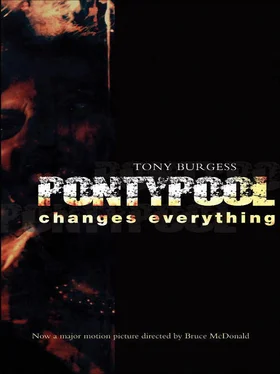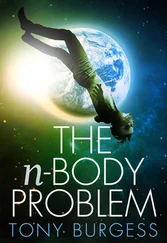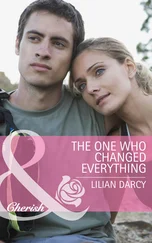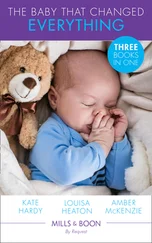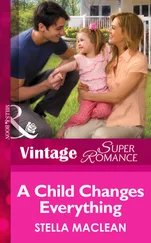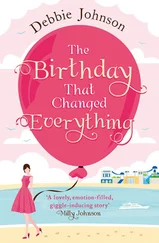Time is passing quickly, frosting its boots in the night. In the morning an icy dew stings its cracked lips. At a height of four hundred feet, three turkey vultures hang off an immense updraft and float downward in a wide circle.
Over the next few days the two men lie in the gravel and weeds. They hold each other, and occasionally one of them has episodes of anguish that cause him to twist in the arms of the other. The episodes subside under the soothing hands and calm whispers of the Higher Power.
In time Greg does die. His Higher Power kneels at his side and crosses the teenager’s arms, lifting the hair from his young, pale face. He stands and looks down at the body that is ruined and vacant and he mouths a short prayer. He walks away from the body without looking back and climbs, in clothes now filthy and tattered, toward the highway. At the side of the road he puts out his thumb. He expects a chariot to descend from a cloud to pick him up. He’s surprised when an old red pick-up truck turns the corner and comes to a dusty stop on the shoulder just ahead of him.
It isn’t possible to grow tired of a stream. A stream is a permanently exciting medium. Stones jiggle in its bed and roots laugh at its edges. The sun shoots Popsicles at a stream. The clouds lay soft, damp towels on its banks. And animals return from the stream shivering with a hundred rainbows weaving in their wet fur.
And the fish.
The fish are different. The fish are always different. In this stream the fish were introduced as minnows through the mouths of metal tubes that dipped below the surface. As adults they return to the precise place of their birth to spawn. They battle like charioteers through the cold water, peeling back their pretty bodies, grimacing with the effort so that their faces look like bullets. And when they arrive home they impale themselves on the sharp metal tips of pipes. By the hundreds they drive their bodies straight onto these stakes, packing the hollow with the bruised flesh of their throats and the frozen bridges of their noses. Throughout the summer aggressive water beetles curve over the openings in military anger. They extract the fibres of meat with barbed toes, feeding it up into their little nightmare faces. The following spring a glistening black chain mail lines the stream, darkening the bottom, where exhausted trout climb along, blind and proud.
By the fall Julie’s belly has begun to bell outward and Jimmy’s body is springing in frog-like leaps over one pubic hurdle after another. By November his hand is huge and he splays it over Julie’s swollen abdomen, marvelling at its strength.
After five weeks the embryo looks like an ear, or a deflated crab claw, or an oyster. The world presses its face against the meat of the uterine wall, blinking its eyes, surprised that the embryo is in the process of looking like anything at all. This cognitive reality, that it always appears as something else, will dog the little omelette all its life.
At a party in the suburbs a teenage boy lifts his lips from a flaming bong, and when the smoke clears he pulls back a blond bang from his eyes and says: “The stages of a fetus are exactly the same as the stages of evolution. First it’s, like, a single cell, right? Like an amoeba. Then it’s a fish, then an amphibian. Then it, like, crawls up onto the land and grows little prehistoric kangaroo legs. And then its tail disappears and it’s like a tiny monkey.” He seals off the glass pipe again and draws in loudly through bubbling water. The girl is amazed by this.
During the fifth month the fetus is listening. It shudders happily in an enclosed world fed by maternal blood. In Julie’s case the maternal blood has a high concentration of protein. From human flesh: the chewy muscles of zombies that she has ambushed near her front door.
The boy exhales a dripping cloud of smoke across the girl’s chest: “No way, man, if, like, a brother and sister conceive a baby, then it’s usually weak and can’t fight off childhood diseases and, it’s like the worst for the species. So it’s, uh, like part of our genetic make-up that we don’t have sex with our siblings.” The girl reaches for the bong. “Yeah, not without a condom anyway.”
Jimmy lifts a pelvic bone to his face and lines up his eyes in the hollow scoops that form a natural mask. Two wide blades of dry bone curve over his head like a tall decorative helmet. He wiggles his tongue lewdly and crosses his eyes. Julie laughs and flicks wet raspberry from the rim of a bowl in her lap onto her brother. He slaps the berry as it strikes his chest and he squeezes the juice through his fingers. He gives out a birdlike cry of anguish. She admires his handsome face as he pretends to die, still holding the tall mask to his closed eyes.
While the girl sucks deeply, filling the glass tube with thick white smoke, the boy pushes down on his crotch with the heel of his hand: “And it’s also bad to eat people. Because, well, you know, aside from being sick and everything, it weakens us if we do it, ’cause it crushes the immune system. And anyway, it’s genetic that we don’t, ’cause if we could we would’ve long ago when we were starving through the winter. And the only survivor would be some fat pig, and we would have died off that first year!” The girl feels a light-headed swirl of connection leading her to some conclusion or other.
After the first snowfall the pregnant couple stay inside most of the time. They conserve their energy and focus on the coming of their child. This is also the beginning of a season-long food shortage. Besides a scarcity of fruits and vegetables, fewer zombies come wandering near their home. So they mete out carefully the food that they do have, carefully rationing out the zombie flesh.
As his sister becomes less mobile Jimmy begins to forage out in the newly fallen snow for easily visible and trackable wildlife. An abundance of rabbits crisscross their property, and Jimmy spends hours falling in the snow behind them, throwing rocks at them, and spraining his ankles in their doorways. He returns late in the morning to Julie, empty handed and surly. As the weeks progress and they begin to hate the sight of each other, Jimmy pretends he’s going hunting and sits out of view at the picnic table, shivering in the cold just to keep away from his sister’s icy glare. Julie sits at the stove, wearing a zombie’s trenchcoat, craving another human being, anyone who speaks, who isn’t mute and stupid.
They survive the winter this way, occasionally patching together an understanding that their mutual hostility is born of their hard life together. On some winter nights, in the deep silence of the deep snow that surrounds them, they hold each other and accept each other with hands that stroke kindly, remembering. The spring will bring them back. The spring will bring new life.
And it does. With the first thaw Jimmy manages to kill his first rabbit. He stands in the doorway swinging it proudly by the ears as Julie applauds with her tired arms. He reaches for a knife above the bench to skin their dinner. Julie feels a strange clench yank at her body from below.
Every version of the birth of a child is always lacking something. Neither a satisfactory miracle nor a base torment, childbirth is only one of the thousands of aggressive events that never actually occur in people’s lives. It is enough of something, however, to put everyone on alert. And Julie and Jimmy are no exception.
Julie is sitting on the zombie trenchcoat that stretches open across the floor. As the coat soaks up the fluid that has crashed out from between her legs, Jimmy frantically lights candles along the dirty edge of the freezer. He crouches down at a distance in front of her and, having no instruction as to any role he might play in the birth, he assumes a position natural to the expectation that an object under pressure will need to be caught, maybe in mid-flight. Julie is receiving more primal instruction, and she follows each muscular cue with a howling face.
Читать дальше
